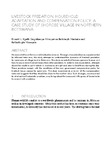Livestock predation, household adaptation and compensation policy: a case study of Shorobe village in the northern Botswana

View/
Date
2012-06-28Author
Kgathi, Donald L.
Mmopelwa, Gagoitseope
Mashabe, Baitshephi
Mosepele, Ketlhatlogile
Publisher
Taylor & Francis, http://www.tandfonline.com/loi/ragr20Rights
This article may be used for research, teaching, and private study purposes. Any substantial or systematic reproduction, redistribution,reselling, loan, sub-licensing, systematic supply, or distributionin any form to anyone is expressly forbidden.Rights holder
University of BotswanaType
Published ArticleMetadata
Show full item recordAbstract
Human-wildlife conflict is a worldwide phenomenon. Through a household survey supplemented by informal interviews, this study attempts to understand the dynamics of livestock predation by carnivores at village level in Botswana. The study reveals that farmers perceive hyenas and lions to cause more livestock losses than other predators. In order to reduce predation, attempts should be made to put livestock in enclosures at night and also to herd them during the day. These practices comply with the conditions of the new government compensation policy for livestock losses caused by carnivores. The study recommends a review of the compensation rates and suggests that they should be closer to the market value. Such changes, accompanied by strict animal husbandry practices, may bring about the increased willingness of households to co-exist with predators.
Collections
- Research articles (ORI) [270]
